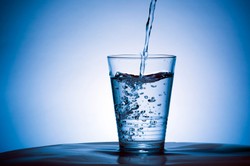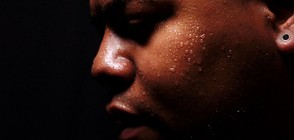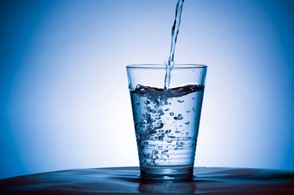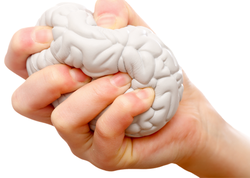A common recommendation is to drink 8 cups of water per day. This is a good average amount for a sedentary person living in a moderate climate. People who exercise in summer may need 5 liters of water per day or more, though. It is not possible to tell any specific amount of water that would be appropriate for everyone. The basic rule is -- the more water you lose (mainly by sweating) the more you need to drink. Water is also in foods; someone who eats a lot of fruits and vegetables, may need to drink only a little amount of water.

5 Myths About Water Drinking
by greentree
How much water do you actually need and how long can you survive without it.
Myth 1: "We Can Survive for Three Days Without Water."
We can often read that we can survive three days without water. In fact, we can survive for a much shorter or longer time: from less than a day to as much as eight days, depending on the circumstances. Surprisingly, the survival time does not seem to depend on age or sex: both a newborn boy or a 90 years old woman, until healthy, may survive for more than a week without water.
If we find ourselves travelling through a desert under the direct sun at 104 °F (40 °C) with no drinking water available, we can expect to survive only up to about 16 hours.
In ideal circumstances, such as resting in a shady place at about 68 °F (20 °C), we may survive up to about eight days. After the 2010 Haiti earthquake, a seven year old boy and his ten year old sister survived for seven days under the rails.
Myth 2: "We Need to Drink Two Liters of Water per Day."
A common advice for adults is to drink two liters of water per day. Even if this can be about the right amount for many sedentary people living in moderate climates, it can be too little or too much for others.
We need to consume as much water as we lose from our bodies, mainly by urinating and sweating. The amount of water we lose greatly depends on how much we sweat and this depends mainly on the ambient temperature and how physically active we are. If we lose 1.5 liters of water one day, we need to consume 1.5 liters that day, and if we lose seven liters, we need to consume that much in order to avoid dehydration. Consuming water includes drinking beverages and eating fruits, vegetables or other foods high in water.
We can quite precisely estimate if we lose more water than consume it: with every liter of water we lose and do not replace, we lose a kilogram of body weight. We can weigh ourselves in the morning, after emptying the bladder and bowel and before eating or drinking anything. When one morning our body weight is lower by more than 0.5 kg than usually and we know that we ate about the same amount of food as usually the day before, we can assume that the weight drop is due to dehydration.
Myth 3: "When No Water Is Available, We Can Prolong Our Survival Time by Drinking Urine."
When we run out of water, drinking urine is not a reasonable method to prolong our survival. By urinating, we excrete waste substances, but we can excrete them only along with a certain amount of water, because our kidneys have a limited ability to concentrate urine. The more waste we produce, the more water we need to excrete in order to excrete the waste. When we drink urine, we consume both the water and the waste, so we will need to excrete more waste and hence more water than when we do not drink urine. With continuing dehydration, our excreted urine will contain more and more waste and less and less water. If we continue to drink such a concentrated urine, we will get smaller amount of water with every single "dose" of urine than we will lose by urination.
While drinking relatively diluted urine when we are still well hydrated might actually extend our survival for few hours, drinking concentrated urine when we are dehydrated makes no sense. Drinking urine can also trigger vomiting or diarrhea and thus cause further water loss.
We can believe anecdotal reports about how someone has survived for six days by drinking only his own urine, but we can think that he might also survive that much by drinking nothing at all.
In summary, drinking urine more likely aggravates dehydration than relieves it and thus shortens our expected survival time rather than prolongs it.
Myth 4: "Drinking Small Amount of Seawater Can Help Prevent Dehydration."
Drinking seawater in any amount is not a good method to prevent dehydration. The problem is similar as with drinking urine: in order to get rid of waste from the seawater (in this case salt), we need to excrete more water with the urine than we consume with seawater. Seawater contains about 4% of salt, which is 40 grams of salt per liter. We need only about 1.5 grams of salt per day, so we will excrete any excessive amount of salt with the urine. If we drink one liter of seawater, we will need to excrete about two liters of water with urine in order to excrete the excessive salt. This means that drinking one liter of seawater will result in one liter of net water loss from our bodies.
There are several methods to obtain drinking water from seawater, even without using a desalinator. We can boil some seawater in a pot and place a piece of cloth over it. The cloth will catch the water vapor, which is pure distilled water. We can then squeeze the water from the cloth and drink it.
Myth 5: "Alcoholic and Caffeinated Beverages can Dehydrate Us."
Drinking mild alcoholic beverages, such as beer with 4 vol% alcohol, do not likely dehydrate us. Alcohol intake temporarily stimulates urine production, but we usually consume more water with the beer as we lose with increased urination. Beer can be even used to correct dehydration when no water is available. There seems to be lack of studies about the effect of stronger alcoholic beverages, such as wine or spirits, on dehydration.
Caffeine in small doses, such as two cups of coffee or five cups of tea per day, does not likely cause dehydration. Caffeine in doses greater than 500 mg per day, for example, from four cups of coffee or twelve cups of tea, can trigger greater urine excretion, but does not likely cause dehydration, because the amount of water we consume with caffeinated beverages is usually greater than the amount of water we lose with increased urination.
Many regular caffeine consumers develop tolerance for most caffeine effects and side effects, including increased urination, in few days.
Thumbnail image source: Nisenet.org (Creative Commons license)
You might also like
How to Lower Cortisol Levels Reduce Stress Hormone and Improve...Cortisol is a steroid hormone regulating metabolism, the immune system and ai...
Walking Your Way to HealthThere is much research that shows that walking is beneficial to body and mind.





 Fructose Malabsorptionon 03/19/2016
Fructose Malabsorptionon 03/19/2016
 Scientific Facts About Sugars and Other Sweetenerson 03/17/2016
Scientific Facts About Sugars and Other Sweetenerson 03/17/2016
 Headache on the Back of the Headon 03/11/2016
Headache on the Back of the Headon 03/11/2016
 Alcohol-Related Headacheon 03/09/2016
Alcohol-Related Headacheon 03/09/2016


Comments
Water is my favorite beverage, my body craves is, I do get dehydrated easily and it is a very uncomfortable situation I therefore watch myself, body cues and hydrate constantly.
I don't obtain water this way by myself - I'm not that desperate yet. But such advice comes from military sources -- I found out they have surprisingly useful information, like you should not drink more than 1.4 liters of water per hour for several continuous hours in order to avoid water intoxication.
I liked your article and appreciated that tip about boiling seawater in a container covered with a cloth :)